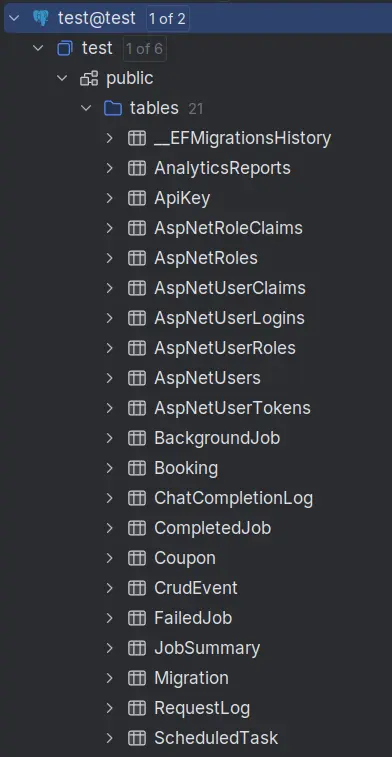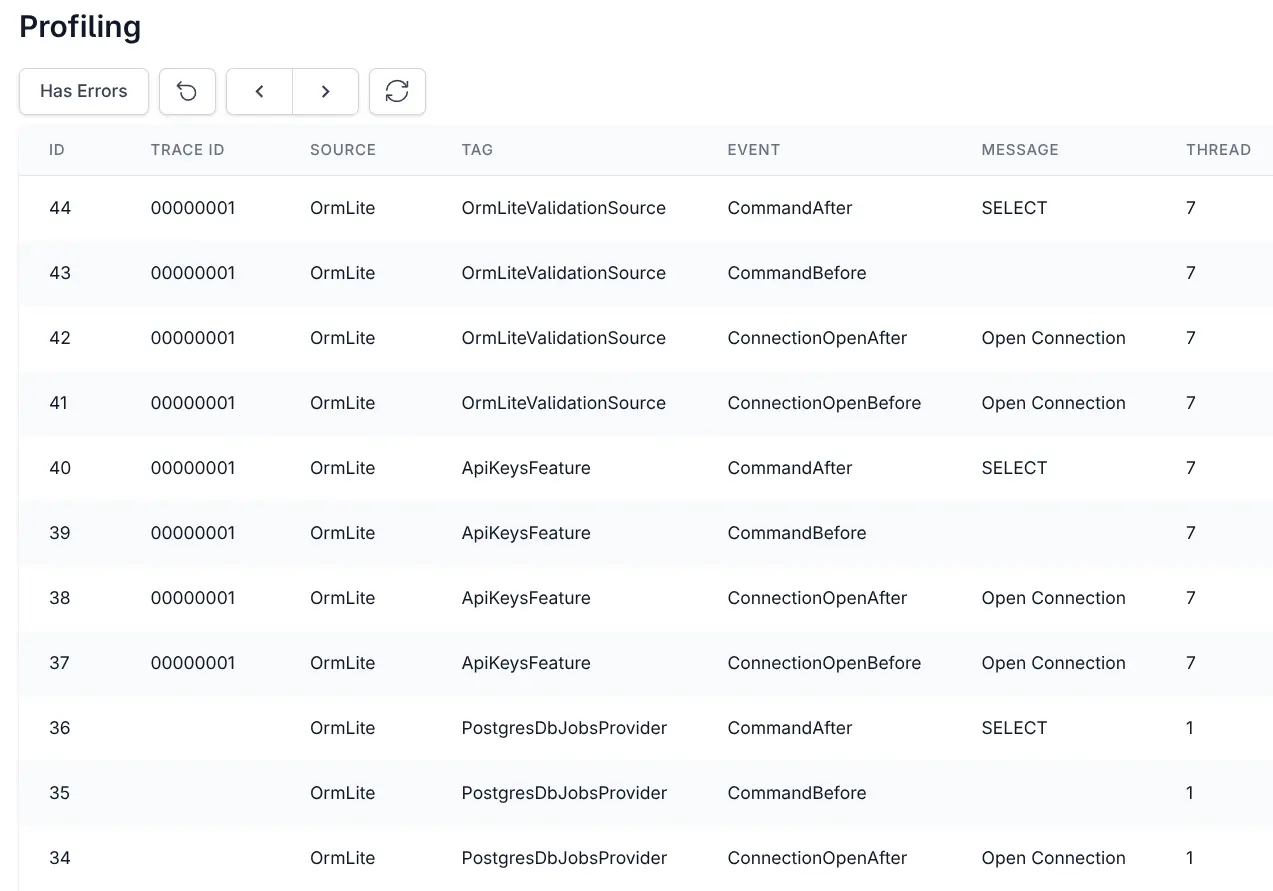OrmLite new Configuration Model and Defaults

New Configuration Model and Defaults
In continuing with ServiceStack's seamless integration with the ASP.NET Framework, providing a familiar development experience that follows .NET configuration model and Entity Framework conventions has become a priority.
Implementing a new configuration model also gives us the freedom to change OrmLite's defaults which wasn't possible before given the paramount importance of maintaining backwards compatibility in a data access library that accesses existing Customer data.
JSON used for Complex Types
The biggest change that applies to all RDBMS providers is replacing the JSV serialization used for serializing Complex Types with JSON now that most RDBMS have native support for JSON.
PostgreSQL uses default Naming Strategy
The biggest change to PostgreSQL is using the same default naming strategy as other RDBMS which matches EF's convention that's used for ASP .NET's Identity Auth tables.
SQL Server uses latest 2022 Dialect
SQL Server now defaults to the latest SqlServer 2022 dialect which is also compatible with SQL Server 2016 and up.
New Configuration Model
OrmLite new modern, fluent configuration API aligns with ASP.NET Core's familiar services.Add*() pattern.
This new approach provides a more intuitive and discoverable way to configure your database connections, with strongly-typed
options for each RDBMS provider.
The new configuration model starts with the AddOrmLite() extension method to configure its IDbConnectionFactory dependency
by combining it with RDBMS provider-specific methods for the RDBMS you wish to use:
UseSqlite()in ServiceStack.OrmLite.Sqlite.DataUsePostgres()in ServiceStack.OrmLite.PostgreSQLUseSqlServer()in ServiceStack.OrmLite.SqlServer.DataUseMySql()in ServiceStack.OrmLite.MySqlUseMySqlConnector()in ServiceStack.OrmLite.MySqlConnectorUseOracle()in ServiceStack.OrmLite.Oracle (community supported)UseFirebird()in ServiceStack.OrmLite.Firebird (community supported)
Each provider method accepts a connection string and an optional configuration callback that lets you customize the dialect's behavior with IntelliSense support.
It's an alternative approach to manually instantiating OrmLiteConnectionFactory with specific dialect providers,
offering better discoverability and a more consistent experience across different database providers.
SQLite
services.AddOrmLite(options => options.UseSqlite(connectionString));
Each RDBMS provider can be further customized to change its defaults with:
services.AddOrmLite(options => options.UseSqlite(connectionString, dialect => {
// Default SQLite Configuration:
dialect.UseJson = true;
dialect.UseUtc = true;
dialect.EnableWal = true;
dialect.EnableForeignKeys = true;
dialect.BusyTimeout = TimeSpan.FromSeconds(30);
})
);
PostgreSQL
services.AddOrmLite(options => options.UsePostgres(connectionString));
With Dialect Configuration:
services.AddOrmLite(options => options.UsePostgres(connString, dialect => {
// Default PostgreSQL Configuration:
dialect.UseJson = true;
dialect.NamingStrategy = new OrmLiteNamingStrategyBase();
})
);
Removed snake_case naming strategy

PostgreSQL now defaults to using the same naming strategy as other RDBMS, i.e. no naming strategy, and uses the PascalCase naming of C# classes as-is.
With this change OrmLite's table and columns now follow EF's convention which is used for ASP.NET's Identity Auth tables.
This is more fragile in PostgreSQL as it forces needing to use quoted table and column names for all queries, e.g.
SELECT "MyColumn" FROM "MyTable"
This is required as PostgreSQL isn't case-insensitive and lowercases all unquoted symbols, e.g:
SELECT MyColumn FROM MyTable
-- Translates to:
SELECT mycolumn FROM mytable
This is already done by OrmLite, but any custom queries also need to use quoted symbols.
SQL Server
services.AddOrmLite(options => options.UseSqlServer(connectionString));
With Dialect Configuration:
services.AddOrmLite(options => options.UseSqlServer(connString, dialect => {
// Default SQL Server Configuration:
dialect.UseJson = true;
})
);
Uses Latest SQL Server at each .NET LTS Release
To keep it modern and predictable, this will use the latest SQL Server Dialect that was released at the time of each
major .NET LTS versions, currently SqlServer2022OrmLiteDialectProvider, which we'll keep until the next .NET LTS release.
Although the 2022 dialect is also compatible with every SQL Server version from 2016+.
To use an explicit version of SQL Server you can use the generic overload that best matches your SQL Server version:
services.AddOrmLite(options =>
options.UseSqlServer<SqlServer2014OrmLiteDialectProvider>(connString));
MySQL
services.AddOrmLite(options => options.UseMySql(connectionString));
With Dialect Configuration:
services.AddOrmLite(options => options.UseMySql(connectionString, dialect => {
// Default MySql Configuration:
dialect.UseJson = true;
})
);
For MySqlConnector use:
services.AddOrmLite(options => options.AddMySqlConnector(connectionString));
Named Connections
The new OrmLite configuration model also streamlines support for named connections, allowing you to register multiple database connections with unique identifiers in a single fluent configuration chain, e.g:
services.AddOrmLite(options => {
options.UseSqlite(":memory:")
.ConfigureJson(json => {
json.DefaultSerializer = JsonSerializerType.ServiceStackJson;
});
})
.AddSqlite("db1", "db1.sqlite")
.AddSqlite("db2", "db2.sqlite")
.AddPostgres("reporting", PostgreSqlDb.Connection)
.AddSqlServer("analytics", SqlServerDb.Connection)
.AddSqlServer<SqlServer2014OrmLiteDialectProvider>(
"legacy-analytics", SqlServerDb.Connection)
.AddMySql("wordpress", MySqlDb.Connection)
.AddMySqlConnector("drupal", MySqlDb.Connection)
.AddOracle("enterprise", OracleDb.Connection)
.AddFirebird("firebird", FirebirdDb.Connection);
Complex Type JSON Serialization
Previously OrmLite only supported serializing Complex Types with a single Complex Type Serializer
but the new configuration model now uses a more configurable JsonComplexTypeSerializer where you can change the default
JSON Serializer OrmLite should use for serializing Complex Types as well as fine-grain control over which types should
be serialized with which serializer by using the .ConfigureJson() extension method for each provider.
services.AddOrmLite(options => {
options.UsePostgres(connectionString)
.ConfigureJson(json => {
// Default JSON Complex Type Serializer Configuration
json.DefaultSerializer = JsonSerializerType.ServiceStackJson;
json.JsonObjectTypes = [
typeof(object),
typeof(List<object>),
typeof(Dictionary<string, object?>),
];
json.SystemJsonTypes = [];
json.ServiceStackJsonTypes = [];
});
})
By default OrmLite uses ServiceStack.Text JSON Serializer which is less strict and more resilient than System.Text.Json
for handling versioning of Types that change over time, e.g. an int Property that's later changed to a string.
In addition to configuring a default you can also configure which types should be serialized with which serializer.
So we could change OrmLite to use System.Text.Json for all types except for ChatCompletion which we want to use
ServiceStack.Text JSON for:
services.AddOrmLite(options => {
options.UsePostgres(connectionString)
.ConfigureJson(json => {
json.DefaultSerializer = JsonSerializerType.SystemJson;
json.ServiceStackJsonTypes = [
typeof(ChatCompletion)
];
});
})
Unstructured JSON with JSON Object
The default Exception to this is for serialization of object, List<object> and Dictionary<string,object> types which is
better handled by #Script's JSON Parser
which is able to parse any valid adhoc JSON into untyped .NET generic collections, which is both mutable and able to
utilize C# pattern matching
for easy introspection.
The new TryGetValue<T> extension method on Dictionary<string,object?> makes it even more convenient for parsing
adhoc JSON which can use the out Type parameter to reduce unnecessary type checking, e.g. here's a simple example
of parsing a ComfyUI Output for the client_id used in a generation:
var comfyOutput = JSON.ParseObject(json);
var prompt = (Dictionary<string, object?>)result.Values.First()!;
if (prompt.TryGetValue("prompt", out List<object> tuple) && tuple.Count > 3)
{
if (tuple[3] is Dictionary<string, object?> extraData
&& extraData.TryGetValue("client_id", out string clientId))
{
Console.WriteLine(clientId);
}
}
Where as an Equivalent implementation using System.Text.Json JsonDocument would look like:
using System.Text.Json;
var jsonDocument = JsonDocument.Parse(json);
var root = jsonDocument.RootElement;
// Get the first property value (equivalent to result.Values.First())
var firstProperty = root.EnumerateObject().FirstOrDefault();
if (firstProperty.Value.ValueKind == JsonValueKind.Object)
{
var prompt = firstProperty.Value;
if (prompt.TryGetProperty("prompt", out var promptElement)
&& promptElement.ValueKind == JsonValueKind.Array)
{
var promptArray = promptElement.EnumerateArray().ToArray();
if (promptArray.Length > 3)
{
var extraDataElement = promptArray[3];
if (extraDataElement.ValueKind == JsonValueKind.Object
&& extraDataElement.TryGetProperty("client_id", out var clientIdElement)
&& clientIdElement.ValueKind == JsonValueKind.String)
{
var clientId = clientIdElement.GetString();
Console.WriteLine(clientId);
}
}
}
}
Table Aliases
One potential breaking change is that table aliases are used verbatim and no longer uses a naming strategy for transforming its name which potentially affects PostgreSQL when an Alias is used that doesn't match the name of the table, e.g:
[Alias("MyTable")] //= "MyTable"
public class NewMyTable { ... }
[Alias("MyTable")] //= my_table
public class OldMyTable { ... }
Aliases should either be changed to the Table name you want to use or you can use the Naming Strategy Alias dictionaries for finer-grain control over what Schema, Table, Column Names and Aliases should be used:
services.AddOrmLite(options => options.UsePostgres(connString, dialect => {
dialect.NamingStrategy.TableAliases["MyTable"] = "my_table";
dialect.NamingStrategy.SchemaAliases["MySchema"] = "my_schema";
dialect.NamingStrategy.ColumnAliases["MyColumn"] = "my_columnt";
}));
Table Refs
A significant internal refactor of OrmLite was done to encapsulate different ways of referring to a table in a single
TableRef struct, which is now used in all APIs that need a table reference.
The new TableRef struct allows for unified APIs that encapsulates different ways of referencing a table:
- Type
new TableRef(typeof(MyTable)) - Model Definition
new TableRef(ModelDefinition<MyTable>.Definition) - Table Name
new TableRef("MySchema") - Schema and Table Name
new TableRef("MySchema", "MyTable")) - Quoted Name (use verbatim)
TableRef.Literal("\"MyTable\"") - Implicitly casts to a string as
new TableRef("MySchema").
OrmLite handles differences between different RDBMS Providers via its IOrmLiteDialectProvider interface.
Previously OrmLite used to maintain multiple overloads for handling some of these differences in referencing a
table but they've now all been consolidated into use a single TableRef parameter:
public interface IOrmLiteDialectProvider
{
bool DoesTableExist(IDbConnection db, TableRef tableRef);
string GetTableNameOnly(TableRef tableRef);
string UnquotedTable(TableRef tableRef);
string GetSchemaName(TableRef tableRef);
string QuoteTable(TableRef tableRef);
bool DoesTableExist(IDbConnection db, TableRef tableRef);
bool DoesColumnExist(IDbConnection db, string columnName, TableRef tableRef);
string ToAddColumnStatement(TableRef tableRef, FieldDefinition fieldDef);
string ToAlterColumnStatement(TableRef tableRef, FieldDefinition fieldDef);
string ToChangeColumnNameStatement(TableRef tableRef, FieldDefinition fieldDef, string oldColumn);
string ToRenameColumnStatement(TableRef tableRef, string oldColumn, string newColumn);
string ToDropColumnStatement(TableRef tableRef, string column);
string ToDropConstraintStatement(TableRef tableRef, string constraint);
string ToDropForeignKeyStatement(TableRef tableRef, string foreignKeyName);
}
For example the QuoteTable(TableRef) method can be used to quote a table. Assuming our dialect was configured
with the my_table Table Aliases, these are the results for the different ways of referencing MyTable:
dialect.QuoteTable("MyTable") //= "my_table" (implicit)
dialect.QuoteTable(new("MyTable")) //= "my_table"
dialect.QuoteTable(new("MySchema","MyTable")) //= "my_schema"."my_table"
dialect.QuoteTable(TableRef.Literal("\"MyTable\"")) //= "MyTable" (verbatim)
dialect.QuoteTable(new(typeof(MyTable))) //= "my_table"
dialect.QuoteTable(new(ModelDefinition<MyTable>.Definition)) //= "my_table"
Improved Observability
Significant effort was put into improving OrmLite's Observability where OrmLite's DB Connections can now be tagged to make them easier to track in hooks, logs and traces.
To achieve this a new Action<IDbConnection> configuration callbacks were added to OrmLite Open Connection APIs
which is invoked before a DB Connection is opened, e.g:
using var db = dbFactory.Open(configure: db => db.WithTag("MyTag"));
using var db = dbFactory.Open(namedConnection,
configure: db => db.WithTag("MyTag"));
using var db = HostContext.AppHost.GetDbConnection(req,
configure: db => db.WithTag("MyTag"));
Which ServiceStack uses internally to tag DB Connections with the feature executing it, or for Db connections used in
Services it will tag it with the Request DTO Name.

If a tag is configured, it's also included in OrmLite's Debug Logging output, e.g:
dbug: ServiceStack.OrmLiteLog[0]
[PostgresDbJobsProvider] SQL: SELECT "Id", "ParentId", "RefId", "Worker", "Tag", "BatchId", "Callback", "DependsOn", "RunAfter", "CreatedDate", "CreatedBy", "RequestId", "RequestType", "Command", "Request", "RequestBody", "UserId", "Response", "ResponseBody", "State", "StartedDate", "CompletedDate", "NotifiedDate", "RetryLimit", "Attempts", "DurationMs", "TimeoutSecs", "Progress", "Status", "Logs", "LastActivityDate", "ReplyTo", "ErrorCode", "Error", "Args", "Meta"
FROM "BackgroundJob"
WHERE ("State" = :0)
PARAMS: :0=Cancelled
dbug: ServiceStack.OrmLiteLog[0]
TIME: 1.818m
DB Command Execution Timing
OrmLite's debug logging now also includes the elapsed time it took to execute the command which is also available on the
IDbCommand GetTag() and GetElapsedTime() APIs, e.g:
OrmLiteConfig.AfterExecFilter = cmd =>
{
Console.WriteLine($"[{cmd.GetTag()}] {cmd.GetElapsedTime()}");
};
ExistsById APIs
New ExistsById APIs for checking if a row exists for a given Id:
db.ExistsById<Person>(1);
await db.ExistsByIdAsync<Person>(1);
// Alternative to:
db.Exists<Person>(x => x.Id == 1);
await db.ExistsAsync<Person>(x => x.Id == 1);
ResetSequence for PostgreSQL
The ResetSequence API is available to reset a Table's Id sequence in Postgres:
db.ResetSequence<MyTable>(x => x.Id);
Data Import example using BulkInsert
This is useful to reset a PostgreSQL Table's auto-incrementing sequence when re-importing a dataset from a different database, e.g:
db.DeleteAll<Tag>();
db.ResetSequence<Tag>(x => x.Id);
db.DeleteAll<Category>();
db.ResetSequence<Category>(x => x.Id);
var config = new BulkInsertConfig { Mode = BulkInsertMode.Sql };
db.BulkInsert(dbSqlite.Select<Tag>().OrderBy(x => x.Id), config);
db.BulkInsert(dbSqlite.Select<Category>().OrderBy(x => x.Id), config);
New SqlDateFormat and SqlChar Dialect APIs
The SQL Dialect functions provide an RDBMS agnostic way to call SQL functions that differs among different RDBMS's.
The DateFormat accepts SQLite strftime() function date and
time modifiers in its format string whilst the Char accepts a character code, e.g:
var q = db.From<MyTable>();
var createdDate = q.Column<MyTable>(c => c.CreatedDate);
var months = db.SqlList<(string month, string log)>(q
.Select(x => new {
Month = q.sql.DateFormat(createdDate, "%Y-%m"),
Log = q.sql.Concat(new[]{ "'Prefix'", q.sql.Char(10), createdDate })
}));
When executed in PostgreSQL it would generate:
SELECT TO_CHAR("CreatedDate", 'YYYY-MM'), 'Prefix' || CHR(10) || "CreatedDate"
FROM "CompletedJob"




